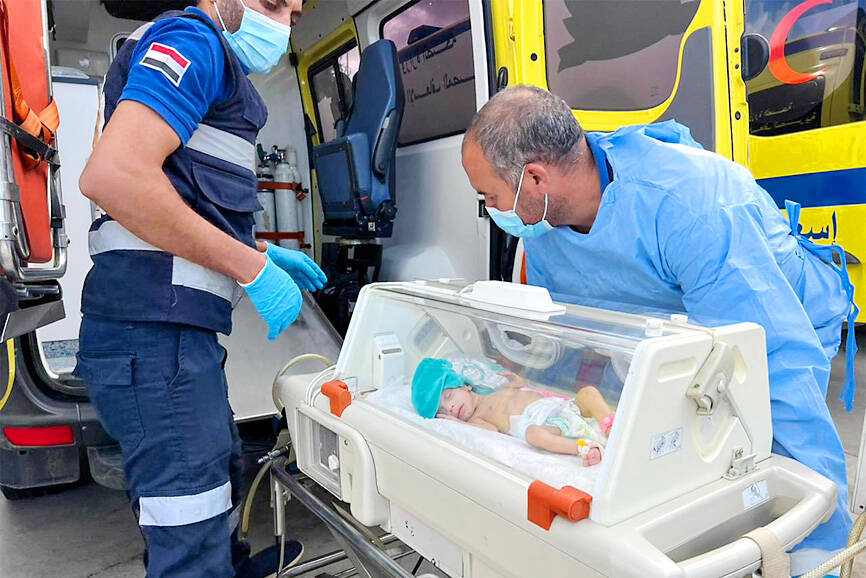Israeli forces yesterday pressed their offensive against Hamas in northern Gaza, battling militants around a hospital where thousands of patients and displaced people have been sheltering for weeks, raising Palestinian fears of another painful standoff and evacuation of a medical facility.
A shell struck the second floor of the Indonesia Hospital, killing at least 12 people, a medical worker inside the facility and the health ministry in Hamas-run Gaza said.
Both blamed Israeli forces. There was no immediate comment from the Israeli military.

Photo: AFP
The advance came a day after the WHO evacuated 31 premature babies from Al-Shifa Hospital. At least 28 were transported to Egypt yesterday. More than 250 critically ill or wounded patients remain stranded at the compound that Israeli forces stormed days ago.
The plight of Gaza’s hospitals is the focus of a battle of narratives over the war’s brutal toll on Palestinian civilians, thousands of whom have been killed or buried in rubble since the conflict was sparked by Hamas’ Oct. 7 rampage into southern Israel. In the wake of the assault, Israeli leaders vowed to eradicate Hamas, destroy its ability to rule Gaza and uproot its militant infrastructure.
Israel says Hamas uses civilians as human shields and operated a major command hub inside and beneath Al-Shifa, while critics say Israel’s siege and relentless aerial bombardment amount to collective punishment of the territory’s 2.3 million Palestinians.
Marwan Abdallah, the medical worker at the Indonesia Hospital, said that Israeli tanks were operating less than 200m from the hospital, and that Israeli snipers were on the roofs of nearby buildings.
As he spoke over the phone, the sound of gunfire could be heard in the background.
Abdallah said the hospital had received dozens of dead and wounded in airstrikes and shelling overnight.
Gaza health ministry spokesperson Ashraf al-Qidra said that about 600 patients, 200 healthcare workers and 2,000 displaced people are sheltering there.
“The occupation aims to evacuate the hospital, as it did in Al-Shifa,” he said.
In a separate development that could relieve some of the pressure on Gaza’s collapsing health system, dozens of trucks yesterday entered the territory from Egypt with equipment from Jordan to set up a field hospital.
Jordan’s state-run media said the field hospital in the southern town of Khan Younis would be up and running within 48 hours.
Babies evacuated from Gaza’s embattled Al-Shifa hospital arrived in Egypt, the country’s state-run media said, after the Palestinian Red Crescent rescue service said it was transporting 28 premature babies across the border.
It was not immediately clear where the other three babies who were evacuated from Al-Shifa were.

Tropical Storm Gaemi strengthened into a typhoon at 2pm yesterday, and could make landfall in Yilan County tomorrow, the Central Weather Administration (CWA) said yesterday. The agency was scheduled to issue a sea warning at 11:30pm yesterday, and could issue a land warning later today. Gaemi was moving north-northwest at 4kph, carrying maximum sustained winds near its center of up to 118.8kph and gusts of 154.8kph. The circumference is forecast to reach eastern Taiwan tomorrow morning, with the center making landfall in Yilan County later that night before departing from the north coast, CWA weather forecaster Kuan Shin-ping (官欣平) said yesterday. Uncertainty remains and

SEA WARNING LIKELY: The storm, named Gaemi, could become a moderate typhoon on Wednesday or Thursday, with the Taipei City Government preparing for flooding A tropical depression east of the Philippines developed into a tropical storm named Gaemi at 2pm yesterday, and was moving toward eastern Taiwan, the Central Weather Administration (CWA) said. Gaemi could begin to affect Taiwan proper on Tuesday, lasting until Friday, and could develop into a moderate typhoon on Wednesday or Thursday, it said. A sea warning for Gaemi could be issued as early as Tuesday morning, it added. Gaemi, the third tropical storm in the Pacific Ocean this typhoon season, is projected to begin moving northwest today, and be closest to Taiwan on Wednesday or Thursday, the agency said. Today, there would likely

DISRUPTIONS: The high-speed rail is to operate as normal, while several airlines either canceled flights or announced early departures or late arrivals Schools and offices in 15 cities and counties are to be closed today due to Typhoon Gaemi, local governments announced last night. The 15 are: Taipei, New Taipei City, Taoyuan, Tainan, Keelung, Hsinchu and Kaohsiung, as well as Yilan, Hualien, Hsinchu, Miaoli, Chiayi, Pingtung, Penghu and Lienchiang counties. People should brace for torrential rainfall brought by the storm, with its center forecast to make landfall on the east coast between tonight and tomorrow morning, the Central Weather Administration (CWA) said. The agency issued a sea warning for the typhoon at 11:30pm on Monday, followed by a land warning at 11:30am yesterday. As of

CASUALTY: A 70-year-old woman was killed by a falling tree in Kaohsiung as the premier warned all government agencies to remain on high alert for the next 24 hours Schools and offices nationwide are to be closed for a second day today as Typhoon Gaemi crosses over the nation, bringing torrential rain and whipping winds. Gaemi was forecast to make landfall late last night. From Tuesday night, its outer band brought substantial rainfall and strong winds to the nation. As of 6:15pm last night, the typhoon’s center was 20km southeast of Hualien County, Central Weather Administration (CWA) data showed. It was moving at 19kph and had a radius of 250km. As of 3pm yesterday, one woman had died, while 58 people were injured, the Central Emergency Operation Center said. The 70-year-old